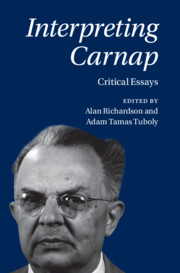Book contents
- Interpreting Carnap
- Interpreting Carnap
- Copyright page
- Contents
- Contributors
- Acknowledgments
- Abbreviations
- Introduction
- Part I Philosophy in New Dress
- Part II Naturalism and Method
- Part III The Logical and the Linguistic
- Chapter 8 Carnap’s Approach to Semantics and Syntax
- Chapter 9 Carnap on the Formality of Logic and Mathematics
- Chapter 10 Carnap on Probability and Induction
- Chapter 11 Metaphysics, Tolerance, and Language Planning
- Part IV Science and Theories
- Bibliography
- Index
Chapter 9 - Carnap on the Formality of Logic and Mathematics
from Part III - The Logical and the Linguistic
Published online by Cambridge University Press: 01 February 2024
- Interpreting Carnap
- Interpreting Carnap
- Copyright page
- Contents
- Contributors
- Acknowledgments
- Abbreviations
- Introduction
- Part I Philosophy in New Dress
- Part II Naturalism and Method
- Part III The Logical and the Linguistic
- Chapter 8 Carnap’s Approach to Semantics and Syntax
- Chapter 9 Carnap on the Formality of Logic and Mathematics
- Chapter 10 Carnap on Probability and Induction
- Chapter 11 Metaphysics, Tolerance, and Language Planning
- Part IV Science and Theories
- Bibliography
- Index
Summary
Throughout his intellectual career, Carnap had developed original views on the nature of mathematical knowledge, its relation to logic, and the application of mathematics in the natural sciences. A general line of continuity in his philosophical work is the conviction that both mathematics and logic are formal or non-factual in nature. Carnap’s formality thesis can be identified in different periods, connecting his early contributions to the foundations of geometry and general axiomatics from the 1920s with his later work on the general syntax of mathematical languages in Logical Syntax. Given the centrality of this idea, how precisely did Carnap understand the formality thesis concerning mathematical knowledge? How was the thesis characterized at different stages in his philosophical work? The aim in the chapter will be to retrace the development of Carnap’s thinking about the formality of logic and mathematics from the 1920s until the late 1930s. As we will see, in spite of his general adherence to the thesis, there were several significant shifts in his understanding, corresponding to changes in his conceptual framework. Specifically, one can identify a transition from a semantic account of formality related to his study of axiomatic theories to a syntactic formalism developed in Logical Syntax.
Keywords
- Type
- Chapter
- Information
- Interpreting CarnapCritical Essays, pp. 171 - 191Publisher: Cambridge University PressPrint publication year: 2024
- 1
- Cited by



